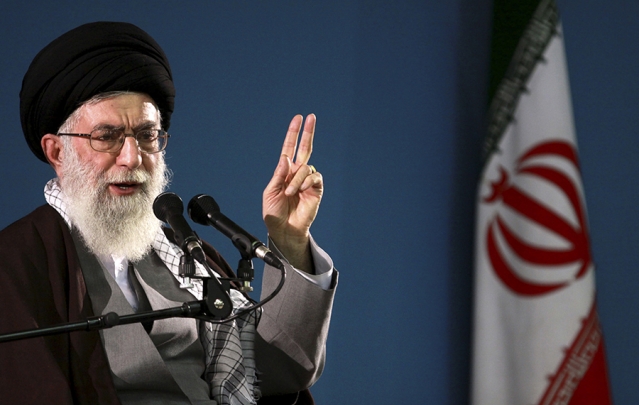Analysis/As Tensions Rise Between U.S. and Iran, Each Side Is Waiting for the Other to Blink
زفي بارئيل/هآرتس: مع تصاعد التوتر بين إيران وأميركا كل منهما ينتظر من الآخر التراجع
Zvi Bar’el/Haaretz/May 18/2019
Both Tehran and Washington eschew war, but must save face. A powerful mediator, like Moscow and Beijing, is necessary to pull them back from the brink
U.S. President Donald Trump gave the Iranians his phone number and told them to call if they want to talk. The Iranians replied that they have no intention of calling, because there’s nobody to talk to. They don’t trust either America or the Europeans.
Iran warned Washington that any attack on it would be answered with great force, but in the same breath, Supreme Leader Ali Khamenei said there won’t be war with America. The New York Times reported that the United States plans to send 120,000 troops to the Gulf on top of bomber squadrons and an aircraft carrier; Trump denied it, calling it fake news.
Two Saudi oil tankers and four commercial ships were damaged by “unknown” saboteurs. Riyadh accused Iran; Tehran denied it. Yemen’s Houthi rebels fired missiles at Saudi oil facilities but said they were responding to the Saudis’ war in Yemen, not trying to deter an attack on Iran.
The deputy commander of the Western forces in Iraq and Syria, British Maj. Gen. Chris Ghika, said there’s no increased threat from Iranian-backed militias. U.S. Central Command disagreed, saying it has concrete information about plans to attack American targets.
Is anyone telling the truth? Does anyone know what’s happening?
Tensions are rising, the atmosphere in the Gulf is filled with flammable vapor and speculation is running wild. Will there be war? Will there be negotiations? Will the Iranian regime collapse? Will it fold, or will it start a conflict because it’s fed up with sanctions?
Iran already made its strategic decision when it said it would reduce its commitment to the nuclear deal. For now, that means increasing its stockpiles of heavy water and low-enriched uranium.
But that decision has no real effect on Iran’s nuclear program as long as Tehran doesn’t enrich uranium to high levels, kick out International Atomic Energy Agency inspectors and restart facilities closed under the agreement. It’s not there yet.
Iran still considers the nuclear agreement in force but has retracted its commitment to uphold the deal in full despite America’s withdrawal from it. While it won’t engage in violations that might prompt military action against it, its full compliance is no longer assured.
This was a cautious step to the brink; now we’re waiting for one side to blink. But it could also be an invitation to negotiate.
The West’s working assumption, especially in Washington, is that the sanctions will force Iran to fold and agree to new negotiations, which would reopen the nuclear deal and also include its ballistic missile program and its intervention in countries like Lebanon, Syria and Yemen. Iran has capitulated to sanctions or threats of war twice before.
Once was in 2003, after America toppled Iraqi dictator Saddam Hussein. Then-President Mohammad Khatami wrote to his U.S. counterpart, George W. Bush, offering comprehensive negotiations over all disagreements including the nuclear program and the Israeli-Palestinian peace process. But Bush ignored the offer, even though Iran froze its nuclear program to prove its goodwill.
The second was when Khamenei approved talks with the United States and five other countries that led to the nuclear deal.
Washington attributed the first capitulation to Iran’s feeling of being threatened militarily after America invaded Iraq and the second to economic pressure created by international sanctions. But while these explanations are theoretically logical, in Iran’s case, they’re insufficient.
Why, for instance, did Iran hold nuclear talks with Europe and the IAEA for a decade – until the end of 2012, about six months before Hassan Rohani was elected president – but consistently thwart and ultimately freeze the negotiations? If Iran feared an American attack in 2003, why it did it then stop fearing one and refuse to fold throughout that decade?
Moreover, if sanctions or threats of war could reliably alter countries’ behavior, why did Washington need to go to war against Iraq after more than decade of sanctions? And why didn’t Iran capitulate to the severe sanctions imposed by the United Nations and the United States before the nuclear deal?
Pragmatic Tehran
The West generally argues that the earlier sanctions weren’t tough enough and the military threat wasn’t seen as credible. As proof, pundits note that despite the sanctions, Iran was able to amass huge foreign currency reserves and finance various development programs, including the nuclear program and an advanced missile industry, thanks in part to a global smuggling enterprise abetted by other countries. Moreover, military action was vehemently opposed by Russia and China, which even threatened that it could spark a superpower war.
Yet in fact, Iran decided to enter substantive negotiations at the very moment when the military threat was removed, under U.S. President Barack Obama.
The greatest threat to the regime was actually the mass protests of 2009. And those weren’t against Iran’s foreign policy but against corruption, the dictatorship of the elite, severe human rights violations and the massive electoral fraud that led to Mahmoud Ahmadinejad’s reelection as president.
Nor was this the uprising Bush had hoped to spark through sanctions – one aimed at toppling the regime. The protesters demanded reforms but didn’t seek to change the system of government.



















